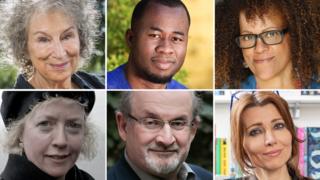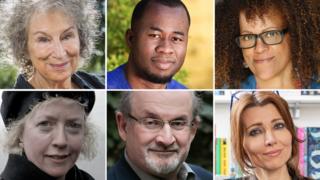Booker Prize 2019: Margaret Atwood leads six authors in the frame to win
Margaret Atwood is the bookmakers’ favourite for her follow-up to The Handmaid’s Tale. …

 Image copyright Booker Prize/PA Media
Image copyright Booker Prize/PA Media The winner of this year’s Booker Prize is to be named later, with the six contenders led by Margaret Atwood for her follow-up to The Handmaid’s Tale.
Atwood’s The Testaments is the bookmakers’ favourite to scoop the prestigious literary award.
The other nominees are Lucy Ellmann, Bernardine Evaristo, Chigozie Obioma, Sir Salman Rushdie and Elif Shafak.
The winner will receive £50,000 at a ceremony at London’s Guildhall, which will be live on the BBC from 21:30 BST.
Both Atwood and Rushdie have won the coveted prize before, in 2000 and 1981 respectively.
Atwood also made the shortlist with The Handmaid’s Tale in 1986. The Testaments, which is set 15 years after the end of that novel, was published in September and sold more than 100,000 copies in the UK in its first week, making it the fastest-selling hardback novel for four years.
Belfast-born author Anna Burns won last year’s prize with her coming-of-age story Milkman.
This year’s shortlist
Margaret Atwood – The Testaments
Set 15 years after the enigmatic final scene of The Handmaid’s Tale, Atwood’s much-anticipated follow-up is narrated by three female characters.
The original was set in a totalitarian state of Gilead, where women are subjugated and enslaved by an oppressive patriarchal society.
The Handmaid’s Tale was adapted for a film starring Natasha Richardson in 1990. More recently, it formed the basis for an Emmy-winning TV series starring Elisabeth Moss.
Canadian author Atwood, 79, won the 2000 Booker Prize for The Blind Assassin. She was also shortlisted for the prize in 1986, 1989, 1996 and 2003.
Peter Florence, chair of the judges, described it as “a savage and beautiful novel that speaks to us today with conviction and power”.
Lucy Ellmann – Ducks, Newburyport
Born in Illinois in 1956 and now based in Edinburgh, Ellmann is the only US author on this year’s shortlist.
Her novel, which runs to a whopping 998 pages, is a stream-of-consciousness monologue that is largely made up of one continuous sentence.
Its narrator is an Ohio housewife who reflects on her past, her family and her country while latticing cherry pies.
Judge Joanna MacGregor described the book as “a genre-defying novel, a torrent on modern life [and] a hymn to loss and grief”.
This is the first year since the controversial decision to make US authors eligible in 2014 that there has only been one American on the shortlist.
If Ducks, Newburyport also goes on to win, it will be the longest winning novel since 2013 winner The Luminaries.
Bernardine Evaristo – Girl, Woman, Other
Born in London in 1959, Anglo-Nigerian author Evaristo has made the Booker Prize shortlist for the first time with her eighth book.
Described as a “fusion fiction” novel, Girl, Woman, Other follows the lives of 12 characters, most of whom are black, British and female.
Judge Xiaolu Guo called it “an impressive, fierce novel… about modern Britain and womanhood” that “deserves to be read aloud”.
Evaristo herself has said she aims to “explore the hidden narratives of the African diaspora” and “subvert expectations and assumptions”.
Chigozie Obioma – An Orchestra of Minorities
Born in Nigeria in 1986 and now based in the US, Chigozie Obioma is the author of two novels that have both been shortlisted for the Booker Prize.
His debut novel The Fishermen previously made the cut in 2015. It went on to inspire a 2018 stage adaptation that finished a run at London’s Trafalgar Studios on Saturday.
An Orchestra of Minorities tells the story of a young Nigerian chicken farmer whose love for a woman drives him to become an African migrant in Europe.
Told in the mythic style of the Igbo literary tradition, it was described by judge Afua Hirsch as “a book that wrenches the heart”.
Salman Rushdie – Quichotte
Sir Salman is no stranger to the Booker Prize. He won in 1981 with Midnight’s Children and made the shortlist again in 1983, 1988 and 1995.
Midnight’s Children went on to be judged the “Booker of Bookers” in 1993 and “Best of the Booker” in 2008.
Inspired by Miguel de Cervantes’ Don Quixote, Quichotte tells of an ageing travelling salesman who drives across America to prove himself worthy of a TV star’s hand. The novel, Rushdie’s 12th, “pushes the boundaries of fiction and satire”, according to jury chair Florence.
Born in India in 1947 and now based in New York, Rushdie is also widely known for his 1988 novel The Satanic Verses, which sparked widespread protests by Muslims and a fatwa from Iran’s Ayatollah Khomeini.
Elif Shafak – 10 Minutes 38 Seconds in This Strange World
British-Turkish novelist Shafak was born in France in 1971 and has published 17 books, 11 of which are novels.
Set in Istanbul, 10 Minutes 38 Seconds in This Strange World is made up of the recollections of a sex worker who has been left for dead in a rubbish bin.
Judge Liz Calder – a publisher and editor whose former colleagues include Sir Salman Rushdie – called the book “a work of fearless imagination”.
Shafak is also a political activist who was tried and acquitted in 2006 for “insulting Turkishness” in one of her books, and was put under investigation by Turkish authorities again earlier this year.
‘A wide-ranging and ambitious line-up’
By Rebecca Jones, BBC arts correspondent
After years of mounting criticism that the Booker Prize had become too worthy and dominated by American novelists, this shortlist is a welcome riposte.
First there are two literary heavyweights with Margaret Atwood and Salman Rushdie. Both enjoy critical and commercial success and have won the prize before.
There is only one American, Lucy Ellmann, who moved to England as a teenager and now lives in Scotland. Yet it is worth noting that a number of the books this year deal with the state of America.
After four years when the shortlist featured no writers from Africa, the Nigerian author Chigozie Obioma makes the cut for the second time.
Elif Shafak, who was born in Turkey, is shortlisted for a novel written in what is her second language.
Bernardine Evaristo completes a wide-ranging and ambitious line-up with a novel told in free verse. Don’t be put off – it’s glorious.
Follow us on Facebook, or on Twitter @BBCNewsEnts. If you have a story suggestion email entertainment.news@bbc.co.uk.




